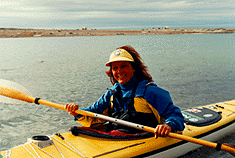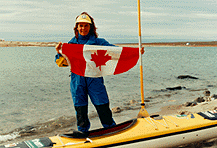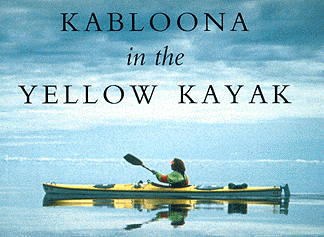


Kabloona in the Yellow Kayak, 298 pp. with 16 pages of colour photos in the hardcover edition, is published by Turnstone Press Marketing, 607-100 Arthur St., Winnipeg, Manitoba, Canada R3B 1H3, (204) 947-1556, fax (204) 942-1555.


Victoria Jason is the first woman to paddle solo through the Northwest Passage. Victoria, a grandmother from Transcona, Winnipeg, spent four years in the Northwest Territories on a touring kayak trip through the Northwest Passage. Kabloona is an Inuit name meaning "stranger". Vicki's kayak, named "Windsong" for the sound it makes as it cuts through the water, is a Bluewater Huron, five-meter fiberglass touring kayak, manufactured by Rockwood Outfitters in Speedvale, Ontario.
Vicki spent the summer of 1991 with Don Starkell, of Paddle to the Amazon fame, and Fred Reffler, another Winnipeg paddler, kayaking northward on the west shore of Hudson Bay, from Churchill to Repulse Bay on the Arctic Circle. Vicki had persuaded Don to let her tag along on his kayak expedition through the Northwest Passage and managed to keep up with him, although he is a very strong competitive paddler. Fred had to drop out of the trip halfway at Arviat due to an arm injury.
At one point they had to paddle ferociously to keep out of reach of a polar bear swimming after them. When they had escaped from the bear, and spread a map out over the two kayaks, the bear suddenly reappeared and they again had to paddle, but now the bear was getting so close, Vicki could see her yellow kayak reflected in its eyes.
After the winter, Vicki returned with Don in 1992 to pull 225-kilo sleds with their kayaks and gear over ice and snow 150 kilometers from Repulse Bay to Gjoa Haven, King William Island. The overland trek was necessary because summer was late arriving. The journey took a crippling toll on her, breaking down her muscles and leaving her physically unable to continue; she was suffering from edema (fluid build-up) around the heart. After a couple of weeks of recuperation, she flew to Coppermine and attempted to rejoin Don on the open-water portion of the trip but found she was still too weak, and returned to Winnipeg after charming the Inuvialuit community. Don attempted to finish the trip with near-fatal results (see the Don Starkell web page).
Vicki's three daughters supported her without reservation for the next two years of her solo arctic adventures. Her many friends and co-workers from the CN Rail Material Distribution Centre also provided a lot of encouragement. That's all they could do. "It's just the freedom, the stillness, the peace and quiet. Once you get hooked on the Arctic, you can't shake it," Vicki said.
In 1993 she started at Fort Providence, NWT, with 157 kilos of supplies, and followed the MacKenzie River 1,600 kilometers north to Gjoa Haven, the intended finishing point of the failed 1991-92 venture. From there, she paddled along the northern coastline to Paulatuk, where high waves and the rapid approach of winter forced her to call it quits on August 10.
"I waited a week there for a break in the weather but the Inuit told me it was not a good time to set out," she said. "I respected their advice."
Along the way, Vicki kayaked with whales, walruses and seals, and camped carefully in grizzly and polar bear country. She travelled several miles with a lonely seal that seemed just as glad for the company as she was. "There were polar bear and grizzly tracks at every campsite. I saw three grizzlies but I was in the kayak each time. I was very careful about bears and didn't cook in my tent."
The hazards of paddling the arctic coast include three or four changes in the weather per day, strange winds, miles of rocky coast where it's impossible to drag a kayak ashore and where the tide can trap you against the boulders. Vicki paddled 8 to 10 hours per day, averaging around 40 kilometers, and visited a settlement every five days. She doesn't mind the solitude and enjoys the open spaces.
"Being there is total exhiliration. There's so much history and I love the Inuit people. They're full of laughter and gaiety. They have a special character."
June 17, 1994, found Vicki waiting patiently for the ice to clear at Paulatuk so she could resume her 2,093 kilometer, 40 day journey to Gjoa Haven. Vicki had left her kayak in Paulatuk with an Inuit family so that she could return to finish the trip. On June 29 she set out and kayaked for over seven weeks to Gjoa Haven.
She encountered grizzlies three times and scared the first two out of camp by firing flare guns. The third approached her camp in the evening, and snorted around before finally leaving. "After he left I heard this weird noise. It was my knees knocking," she laughs.
Often, she paddled in the midnight sun when the sea was calmer, putting in 64 kilometers over 10 hours. Her safety equipment included flare guns, rifle, Global Positioning System portable receiver, and ham radio for emergency communication. She was stranded on an island for three days by a vicious Arctic storm and managed to shelter herself from the storm by using large drums that had been left on the beach. The last few days of her trip were so cold and wet that she couldn't get her clothes dry.
Her common-sense caution and respect for the elements enabled her to survive her journey unscathed.
When she got to Gjoa Haven on August 23rd she retrieved from a small coastal cove a rose she had left there two years previously while recuperating from her illness. On August 25th, a fourth grandchild was born to the youthful, charming and courageous grandmother.
The above text is by D. Kurt, compiled from interviews with Victoria Jason and from articles by Marjorie Strano (Above and Beyond magazine), Wanda McConnell (The Herald), Nancy Westaway (Winnipeg Free Press), Naomi Lakritz (Winnipeg Free Press) and Brad Oswald (Winnipeg Free Press).
 Back to the Rivers Page
Back to the Rivers Page